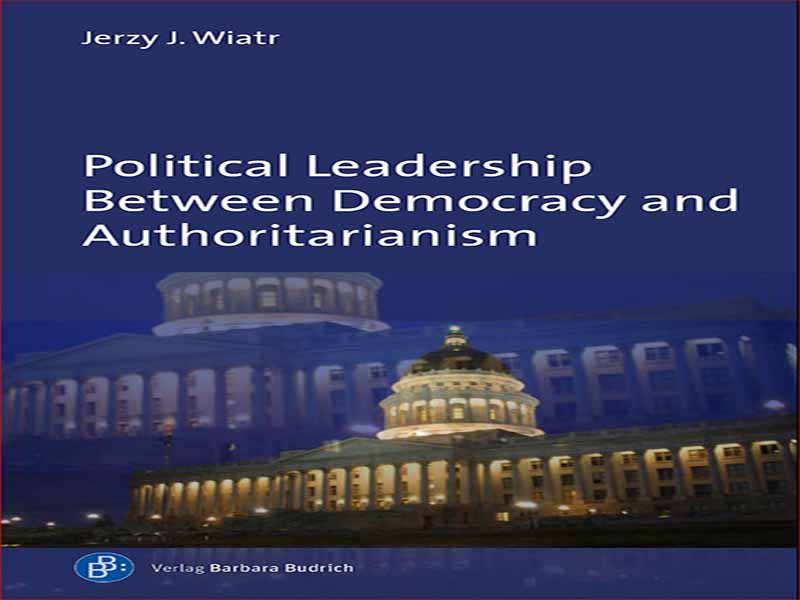- عنوان کتاب: Political Leadership Between Democracy and Authoritarianism
- نویسنده: Jerzy J. Wiatr
- حوزه: دموکراسی
- سال انتشار: 2022
- تعداد صفحه: 206
- زبان اصلی: انگلیسی
- نوع فایل: pdf
- حجم فایل: 3.76 مگابایت
رهبری سیاسی از دیدگاه های مختلف توسط مورخان، فیلسوفان، جامعه شناسان و دانشمندان علوم سیاسی مورد بررسی قرار گرفته است. از دوران باستان، مطالعه سیاست بر نقش مردان (به ندرت زنان) که بر دیگران حکومت و رهبری میکردند متمرکز بوده است: پادشاهان، فرماندهان نظامی و پیامبران. مورخان از پلوتارک الهام گرفتند که شرح حال فرمانروایان مشهور او به عنوان راهنمای اخلاقی برای شاهزادگان آینده بود. متکلمان، از سنت آگوستین به بعد، تلاش کردند بین حاکمان مشروع و ظالم تمایز قائل شوند. نویسندگان سیاسی به دنبال ترسیم یک حاکم کامل و تعریف معیارهای اخلاقی حکمرانی خوب بوده اند. از زمان «شاهزاده» نیکولو ماکیاولی، آنها بُعد جدیدی را به معیارهای قدیمی اضافه کردند – معیار اثربخشی. فیلسوفان تاریخ در ارزیابی خود از نقش افراد بزرگ متفاوت بودند: از جبرگرایی گئورگ هگل تا دیدگاه رمانتیک توماس کارلایل از تاریخ بشر به عنوان محصول کنش تعداد معدودی – قهرمانان. زمانی که جامعه شناسی به عنوان یک رشته دانشگاهی جدید ظهور کرد، به شدت بر فرآیندها و نهادهای اجتماعی به قیمت از دست دادن نقش افراد تأکید کرد. با این حال، به زودی، عمدتاً تحت تأثیر دانشمندان ایتالیایی گائتانو موسکا (1858-1941) و ویلفردو پارتو (1848-1923)، توجه به مطالعه نخبگان سیاسی که به عنوان بازیگران اصلی تاریخ شناخته میشوند معطوف شد (Mosca 1939, Albertoni 1982). ). برخی از روانشناسان، به ویژه گوستاو لو بون، منتقد و دشمن «توده ها»، رهبران بزرگ را تنها جایگزین حکومت آشفته جمعیت می دانستند (Le Bon 1912). پیشگامان رویکرد بیولوژیکی برای مطالعه سیاست پیشنهاد کردند که “انتخاب طبیعی به هومو ساپینس ها، مانند سایر نخستی های اجتماعی، “تعصب” ذاتی نسبت به ساختارهای اجتماعی و سیاسی سلسله مراتبی داده است” و به این نتیجه رسیدند که “این گرایش ذاتی یک گرایش عمده است. – اما نه تنها – دلیلی که چرا اکثریت قریب به اتفاق جوامع سیاسی ماهیت خودکامه داشته و دارند” (پترسون و سومیت 2001: 186).
Political leadership has been studied from various perspectives by historians, philosophers, sociologists and political scientists. Since antiquity, the study of politics has focused on the role of men (rarely also women) who have ruled and led others: monarchs, military commanders, and prophets. Historians took their inspiration from Plutarch, whose biographies of famous rulers served as a moral guide for future princes. Theologians, from St. Augustine on, attempted to distinguish between legitimate rulers and tyrants. Political writers have sought to portrait the perfect ruler and to define the moral criteria of good governance. Since Niccolo Machiavelli’s “Prince”, they have added a new dimension to the old criteria – that of effectiveness. Philosophers of history differed in their assessment of the role of great individuals: from Georg Hegel’s determinism to Thomas Carlyle’s romantic view of human history as a product of the action of selected few – the heroes. When sociology emerged as a new academic discipline, it strongly emphasized social processes and institutions at the expense of the role of individuals. Soon, however, mostly under the influence of the Italian scholars Gaetano Mosca (1858-1941) and Vilfredo Pareto (1848-1923), attention shifted to the study of political elites, seen as the principal actors in history (Mosca 1939, Albertoni 1982). Some psychologists, notably Gustav Le Bon, critical of and hostile to the “masses”, saw great leaders as the only alternative to the chaotic rule of the crowd (Le Bon 1912). Pioneers of the biological approach to the study of politics suggested that “natural selection has endowed homo sapiens, as it did other social primates, with an innate ‘bias’ toward hierarchical social and political structures” and concluded that “this innate tendency is a major – but not the only –reason why the overwhelming majority of political societies have been and continue to be authoritarian in nature” (Peterson and Somit 2001:186).
این کتاب را میتوانید از لینک زیر بصورت رایگان دانلود کنید:
Download: Political Leadership Between Democracy and Authoritarianism




































نظرات کاربران